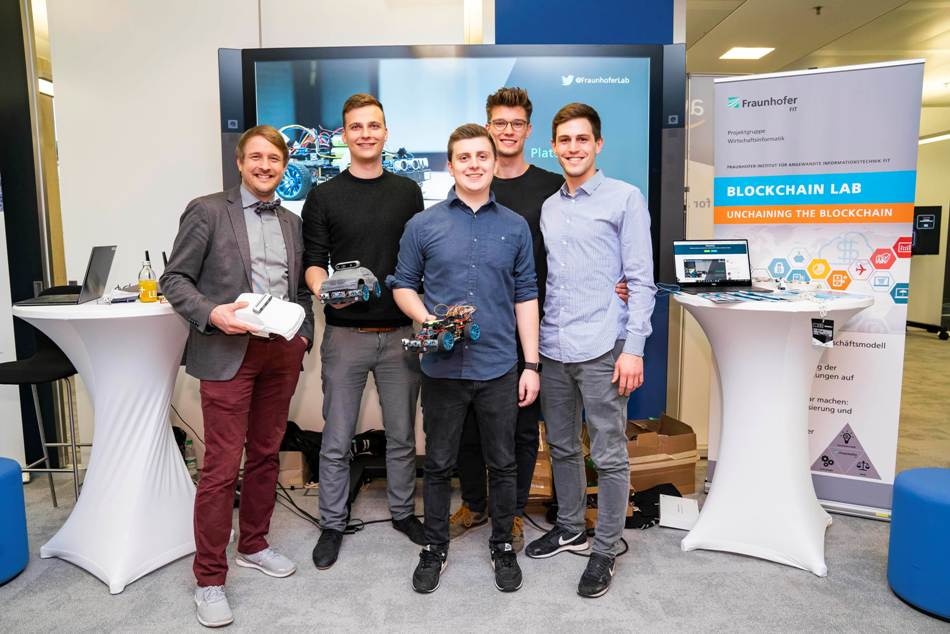Feb 19 2019
At the international MOBI Grand Challenge, the University of Bayreuth students have won third place. The competition premieres groundbreaking applications of blockchain technology in the areas of automotive mobility and transport. With a novel concept that integrates autonomous driving with a blockchain-controlled system of remuneration, the Bayreuth team was able to triumph over 21 other teams in the final round, beating even teams from renowned US universities. After the final round of the competition in Munich on February 15th, 2019, the team under the leadership of Prof. Dr. Gilbert Fridgen received the prize-money of US $21000.
 The University of Bayreuth team presents its award-winning development in the BMW IT Center in Munich (left to right): Prof. Dr. Gilbert Fridgen, Nicolas Ruhland, Matthias Babel, Jonas Brügmann and Jannik Lockl. (Image credit: Enes Kucevic)
The University of Bayreuth team presents its award-winning development in the BMW IT Center in Munich (left to right): Prof. Dr. Gilbert Fridgen, Nicolas Ruhland, Matthias Babel, Jonas Brügmann and Jannik Lockl. (Image credit: Enes Kucevic)
Matthias Babel, Jonas Brügmann and Nicolas Ruhland, students of Business Informatics at the University of Bayreuth, have developed an advanced and marketable concept of “platooning”. The term represents a process by which two or more vehicles drive behind one another spaced apart literally by just centimeters. The vehicles continuously exchange their sensor data, meaning that the steering wheel, braking pedals, and accelerator of the following vehicles are automatically regulated with a high level of precision. Through this exchange of data, all of the vehicles involved are linked to each other by a kind of invisible tow bar, and thus can form a convoy. The vehicle at the front is managed by an actual driver, while the passengers in the subsequent vehicles experience the feeling of autonomous driving without having to relinquish total control to any non-human systems.
Along with this exchange of sensor data, the Bayreuth champions combined a system of remuneration utilizing IOTA—a derivative of Blockchain technology. The sensor data forms the foundation of cashflows running in parallel, with which costs are paid virtually the instant they accrue. This new application of IOTA was created by students in the BlockchainLab of the Fraunhofer Project Group Business & Information Systems Engineering, which collaborates closely with the University of Bayreuth. “We were all very surprised, but at the same time proud, when we found out that we were among the finalists of the MOBI Grand Challenge”, said Jonas Brügmann. “It was so impressive the way Jonas, Matthias, and Nicolas grew together as a team, and with what intensity they set about winning over the international jury”, Jannik Lockl M. Sc. states, having directed the students as a member of the Bayreuth Blockchain Research Group. He is on the staff of Prof. Dr. Gilbert Fridgen, head of the BlockchainLab, who at the University of Bayreuth has a professorship for Information Systems Management & Sustainable IT Management.
To clearly prove to the jury how platooning can be integrated with a system of remuneration on the foundation of a blockchain, the Bayreuth team essentially constructed model cars to transform the concept into reality. The prototype examples revealed how a commercially feasible form of platooning could become a reality in the not so distant future. “The vision of autonomous driving, which just a couple of years ago was dismissed as wishful thinking, is today coming ever closer to being implemented. And the innovative ideas of our successful student team have made a great contribution to this. Platooning represents an important step towards fully autonomous road traffic, and will quite possibly play an important role in modern, environmentally-friendly transport systems in the very near future”, believes team leader Fridgen.
Background
The MOBI Grand Challenge, which was first conducted in 2018/19, is an international competition conceived cooperatively by the Mobility Open Blockchain Initiative (MOBI) and die Trusted IoT Alliance (TIoTA). MOBI is the world’s largest consortium working on the research and use of blockchain technology in the automobile industry. With over 30 participating enterprises, it comprises of 70% of the world’s automobile market. Famous international players, like Bosch, BMW, IBM, and GM, for instance, are partners of the MOBI Grand Challenge.